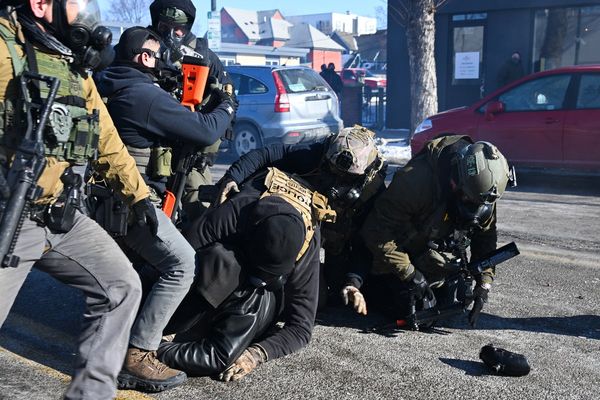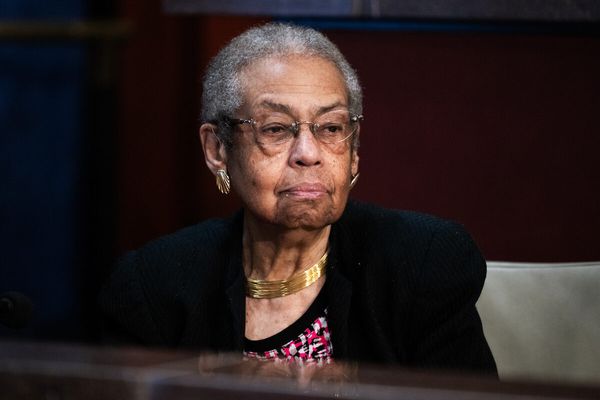Born in Scotland in 1979, Dawn O’Porter is a TV presenter turned bestselling author. After studying acting at the Liverpool Institute for Performing Arts, she became a runner, before stepping in front of the camera in the early noughties for a string of zeitgeisty documentaries such as Super Slim Me, Extreme Wife, Mail Order Bride and later My Breasts Could Kill Me, exploring breast cancer, having lost her own mother to the condition. O’Porter pivoted to novel writing in 2006, and she has since written eight books – her latest, Cat Lady, is out now. She lives in Los Angeles with her two children and husband, actor Chris O’Dowd.
Here I am, four years old and getting my photo taken at primary school. I look quite miserable, probably because I wanted attention all the time, but got quite shy when someone actually gave it to me.
At the time, I was living in Guernsey with my mum and sister at my grandparents’ house. We’d moved from Scotland, where my dad lived, a couple of years before. I took their divorce pretty well as I was only one when it happened, and while Dad wasn’t there, life was mainly good. Guernsey is a brilliant place to be a kid, and I have an older sister, Jane, who would see me in the school corridors and put my hair into shape and pull my socks up.
I was always a bit naughty, and I remember getting into trouble a lot after my mum died when I was seven. There was one incident in particular: we had to put our snacks at the front of the classroom in these baskets, and mine were always really rubbish. This girl called Amy used to get Fruit Pastilles, so I snuck in at breaktime and stuck my name sticker over hers. When snack time arrived, I got her sweets and she had nothing. I was found out and had to spend a whole lunchtime sitting outside the headteacher’s office. My aunt gave me a packet of Fruit Pastilles that I had to hand deliver to Amy the next day. People say it was a reaction to my mum dying, but I was already quite cheeky.
If you lose a parent when you’re little, you get a couple of days off and then it’s back to school. Everyone knows this huge thing has changed for you; it was even announced in assembly. One girl said to me: “We thought you were making it up to try to get attention,” which probably shows what type of person I was.
I was always a funny little girl who was theatrical, but after my mum died I became even more so. I didn’t want anyone to mention the elephant in the room. I became the kid who spent more time trying to make people laugh than learning, and failed at everything as a result. The joking around was annoying, but I just couldn’t stop doing it. I got pulled up on it when I went to drama school years later. A teacher said to me: “You hide your pain by trying to make people laugh.” Like it was some really negative thing! I thought: “At least I’m not being miserable, and if that’s the reflex reaction to what I’ve been through, I’m not going to be ashamed of it. I’m going to embrace it.”
I’ve also always wanted to have fun with my clothes, but when you grow up on a small island like Guernsey you’ve got to be really brave to break away from what everyone else is doing. So I used to follow the herd, even though I knew I wanted to look different. Then, in my early 20s, I discovered vintage and that’s when it came together. After I gave up on modern fashion it was such a relief and everything made sense. I was raised by a dressmaker – my uncle made furs – and he’d turn clothes inside out and show me how they were stitched together, and I have so much sensory nostalgia for what my mum was like.
I cherish the pictures of her in the 1970s and 80s with the shoulder pads, lipstick and big hair, and I’ll always remember her red nails and the way she smelled of Chanel No 5. My mother-in-law wears it now and I love getting a good whiff, but I am not ready to wear it yet. Once I was walking through an airport and they were giving out samples, and this woman sprayed me with it before a long haul flight. I remember feeling: “Please get this off me.” It was too emotive.
When I started to present TV I felt so lucky that I didn’t have to turn anything on for the camera and got to hold on to who I was, as I have had presenter friends who have had to almost play a part. There were some terrible outfit choices though, sometimes inappropriate. Like when I was interviewing these Mormon polygamists in a very serious scene while wearing a psychedelic top and purple leggings with a massive bouffant. What the hell was I going for?
The first year I lived in LA was hard, and I didn’t know many people so finding new friends felt very forced. I met Chris a year later and it all got easier. He’d just done Bridesmaids, so we were finally living the LA life I had imagined, walking on red carpets and going to parties. But the change of location had an effect on my career. I went to a few TV meetings, but I knew I wasn’t what the producers were looking for. I’m very low-maintenance in general, and a lot of people commented on how I didn’t look like an American presenter. Over there, a lot of TV personalities look like someone’s mistress – a short tight dress, long straight hair. Whereas people would say to me all the time: “Who do you remind me of?” and after 10 minutes it’s always: “That’s it! Mary Poppins!” What I realised is how great the women on British telly look. There’s so many people who aren’t supermodels but are on TV screens, and it’s something we should be proud of.
These days, as a writer, I always make an effort to look ready: full makeup and a great dress. I need to feel as if I’ve gone to the office, even if it’s just a desk in our spare room. I have to be disciplined. I’ve got really good at dropping the kids off at school, doing some exercise, drinking coffee and eating breakfast, and getting dressed so that I am ready to get stuck in at 10am. I write solidly until 4pm, then pick the kids up at 5pm. I try not to write at weekends and in the evenings so I can see my family, but it’s taken me eight books to get into a routine that works.
This photo was from a time before everything kicked off. It began for me in Melrose primary school, and when me and Chris moved in together we lived on Melrose Avenue. I like how life gives you these words or symbols that have some kind of circularity. There’s also an innocence to this picture. When it was taken I didn’t know my mum would die and that I would be brought up by my grandparents and my aunt and uncle. That little girl went through an awful lot. It’s sad to see her face, but here I am, still with the same hair, and everything is fine.







